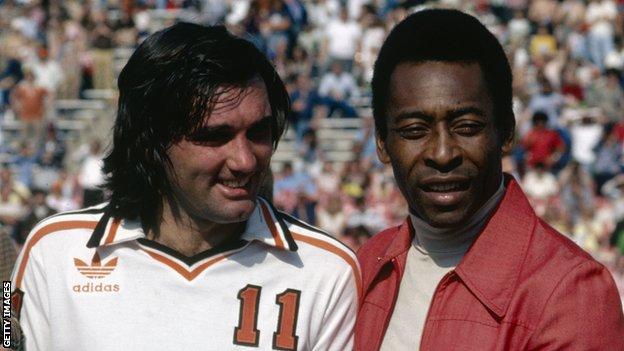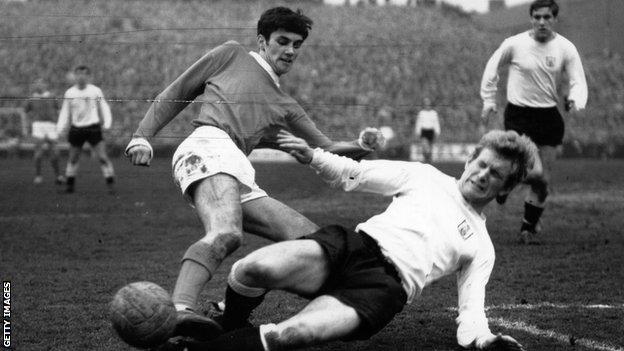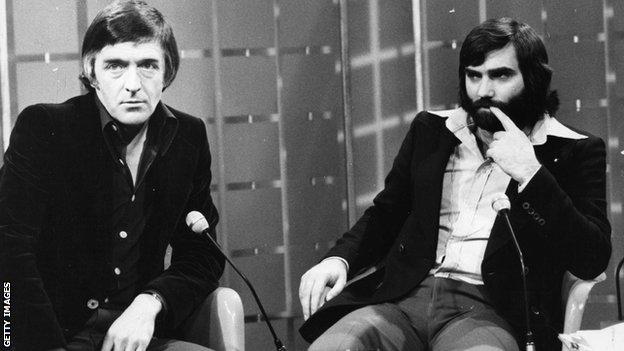George Best: A look back at BBC coverage of the legend's death 15 years on
Last updated on .From the section Irish

For those of us caught up in that moment in whatever shape or form, it seems incredible that Wednesday was 15 years to the day since George Best's death.
And it's a quirk of fate that another of the world's legendary footballers Diego Maradona will have the same 25 November anniversary date following his death at the age of 60.
The BBC News report on that Friday afternoon quoted Cromwell Hospital in London, which had cared for Best over the final eight weeks of his life, as saying that the Manchester United and Northern Ireland great had died of multiple organ failure at 12:55 GMT after "a long and valiant fight".
Son Calum, who had kept a bedside vigil, said: "Not only have I lost my Dad... we've all lost a wonderful man."
Best's father Dickie, who was then 87 and passed away himself in April 2008, was among relatives at the footballing great's bedside and asked for the family to be left to grieve in peace.
Best's sister, Barbara McNarry, added: "To the thousands upon thousands of people who have sent cards and e-mails, we have taken great comfort from them, especially during the long hours."
Shortly after the death was announced, the family viewed the many flowers and messages left by fans outside Cromwell Hospital.
Then Prime Minister Tony Blair led tributes to the man he called "probably the most naturally gifted footballer of his generation, one of the greatest footballers the UK has ever produced".
"Anyone who has seen him as a football fan will never forget it," Mr Blair said from the Commonwealth Head of Governments meeting in Malta.
Irish Prime Minister Bertie Ahern, himself a Manchester United fan, said: "George should be remembered as the very best at what he did. He was quite simply a football genius."
Sir Bobby Charlton said his former Manchester United team-mate "made an immense contribution to the game, and enriched the lives of everyone that saw him play".
"Football has lost one of its greats, and I have lost a dear friend. He was a marvellous person," said the England 1966 World Cup hero, who played alongside Best in United's European Cup-winning side two years later.
A statement from the club said: "For the goals, the audacious dribbles and all the wonderful memories, Manchester United and its legions of fans worldwide will always be grateful."
Judging by the output on the day, both the BBC News and Sport websites opted for a clearing of the decks as both wings produced a series of articles which documented the life of an extraordinary football talent whose off-field travails of womanising, alcoholism, prison and his final health battles after a liver transplant arguably came to overshadow his sporting achievements.
'Dazzling skills and champagne lifestyle'
The BBC News website's obituary said Best would be "remembered for his dazzling skill on the pitch, and for his champagne lifestyle away from it".
"His heyday occurred during the 'swinging sixties', and, with his good looks, he brought a pop star image to the game for the first time.
"He wrote his own epitaph when he once said: 'I was the one who took football off the back pages and put it on to page one'," the unnamed obituary writer added.
BBC Sport writer John May had a busy day as he penned two pieces headlined, 'Was George the Best?' and 'The best and worst of a legend'.
"Perhaps the best pointer to where George Best sits among the footballing gods comes from the man generally reckoned to be the best," said May in answer to his own question.
"Pele himself once dubbed Best 'the greatest footballer in the world'. Whether that was an honest, realistic assessment or a diplomatic platitude can be argued long into the night.
"Rating the greats is always something of an empty exercise, and if you are dealing in the currency of cold hard facts and statistics, then the Belfast Boy doesn't measure up.
"But is greatness purely to be measured in terms of silverware and numbers? Best won his share of honours, but his greatness was something that could not be quantified.

"People might have stared awe-struck at Pele's magnificence and rejoiced in Maradona's devilry and dash," added May.
"But they were transfixed, bewitched and delighted by the impish, cheeky skills of Best that invariably brought a smile to all except the defenders who had to face him.
"No-one will forget Best's goal against Benfica in the 1968 European Cup final where he broke clear, kept the coolest of heads and left the keeper groping with a body swerve that would have dislocated the hips of a mere mortal."
The oft-quoted story about a waiter asking Best "where did it all go wrong?" as he lay alongside a Miss World in an hotel bedroom counting their casino winnings from a profitable night out was the inevitable opening gambit in John May's 'The best and worst of a legend'.
"It was only some years later that Best observed: 'Perhaps he saw something in me that I didn't'.
"Best also said: 'I was born with a great gift, and sometimes with that comes a destructive streak. Just as I wanted to outdo everyone when I played, I had to outdo everyone when we were out on the town'."

Legendary BBC chat show host Michael Parkinson, who had interviewed Best on numerous occasions was better placed than most to give an appraisal of his sporting and indeed cultural legacy.
"Perhaps it was that close friendship that allowed Parkinson to make a more balanced assessment when he asserted that Best 'lost a lost of goodwill when he kept drinking after his liver transplant and that's very sad'," added May.
"The only tragedy George Best had to confront," Parkinson concluded, "is that he will never know how good he could have been."
Best's Northern Ireland team-mate Pat Jennings also reminisced fondly in a BBC Sport website piece about a wet April evening in 1964 when the two teenagers made their international debut in a 3-2 win over Wales in a Home Internationals game in Swansea.
"It was a real wet night on a boggy pitch and he was just skating over the top of the ground. You knew that this was somebody special, even at that age," the former Tottenham and Arsenal keeper told BBC Sport's Mike Burnett..
"I was his room-mate. He played 37 times for Northern Ireland and I roomed with him on all those occasions."
Best might have been known for his partying lifestyle, but sometimes fame seemed to be a prison for him, as Jennings observed.
"In those days, after training we'd go out on the town whether it was in London, Belfast or somewhere else but a lot of the times he'd just sit in the room and watch television because he'd get tortured whenever he went out."
Yet Jennings told BBC Sport that despite his superstardom, Best remained one of the most genuine people he has ever met.
"If people had come to him in those days, which they did on many occasions, and asked him to visit kids in hospital or visit a home, he'd have been the first one there."



